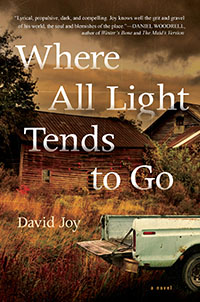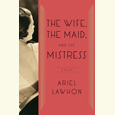The Shadow of Death
The young hero of Where All Light Tends to Go, David Joy’s debut novel, struggles to overcome a legacy of crime
Jacob McNeely feels trapped. The hero of David Joy’s debut novel, Where All Light Tends to Go, Jacob is eighteen, an age when life should begin to open its myriad possibilities. Instead, he feels stuck in his piddling hometown in North Carolina’s Blue Ridge Mountains, doomed to follow the hopeless path of his meth-dealing father. Jacob’s disappointment derives not simply from lost prospects but also from knowing that he has allowed “what I was born into” to define him: “Mama snorted crystal, Daddy sold it to her, and I’d never had the balls to leave.”
 Alan Rhew copy.jpg) As Jacob is the first to point out, he played a prominent role in building his own cage: he dropped out of school the day he turned sixteen, and he has done nothing in the intervening years to train himself for any future other than the drug trade. Jacob hasn’t even bothered to learn how to replace carburetors in the auto shop his father, Charlie, uses to launder money. As much as he bemoans his fate and gags at the notion that he’ll never go anywhere or amount to anything, what he really needs is a kick in the pants.
As Jacob is the first to point out, he played a prominent role in building his own cage: he dropped out of school the day he turned sixteen, and he has done nothing in the intervening years to train himself for any future other than the drug trade. Jacob hasn’t even bothered to learn how to replace carburetors in the auto shop his father, Charlie, uses to launder money. As much as he bemoans his fate and gags at the notion that he’ll never go anywhere or amount to anything, what he really needs is a kick in the pants.
The pants-kicking comes early in Joy’s novel, and it comes in two forms. First Jacob learns that the love of his life, Maggie Jennings, has broken up with her loser boyfriend—immediately after Jacob rearranges the guy’s face at a graduation party—and makes it clear that she wants Jacob to join her when she leaves for college in the fall. Then Jacob participates, along with two of Charlie’s hatchet men, in the botched silencing of a potential police informant, though they neither glean the desired information nor succeed in finishing off the cop. Such loose ends infuriate Charlie, and soon Jacob is learning the proper way to dispose of bodies.
 With felonies piling up on one side of the scale and a new life with Maggie waiting on the other, Jacob ponders the incomprehensible but immanent power that appears to control his life: “I was slowly coming to terms with my fate,” he says, “and while there was a part of me that desperately wanted to get out, there was a much bigger part of me that knew I never would and accepted it.” Charlie’s wickedness must run through his own veins, Jacob figures, and “With that type of shit inside of me, it was only a matter of time before the darkness showed itself.” Or, as he puts it with colorful economy, “Blood’s thicker than water, and I was drowning in it.”
With felonies piling up on one side of the scale and a new life with Maggie waiting on the other, Jacob ponders the incomprehensible but immanent power that appears to control his life: “I was slowly coming to terms with my fate,” he says, “and while there was a part of me that desperately wanted to get out, there was a much bigger part of me that knew I never would and accepted it.” Charlie’s wickedness must run through his own veins, Jacob figures, and “With that type of shit inside of me, it was only a matter of time before the darkness showed itself.” Or, as he puts it with colorful economy, “Blood’s thicker than water, and I was drowning in it.”
As the violence escalates and Jacob tries to extricate himself, Charlie McNeely emerges as a chilling villain. His rise to regional prominence has required him to treat rivals ruthlessly and to punish disobedience among his minions with homicidal alacrity. When Charlie takes a life, he leaves a travel-size Bible with the body, perfect for making the journey to the other side. Such details indicate that Joy—whose first book, Growing Gills, is a memoir about fly fishing—has studied his forebears in Southern gothic: Where All Light Tends to Go mixes Flannery O’Connor’s twisted religion with Cormac McCarthy’s mythopoetic violence. Jacob’s confrontation with his father, who believes his son to be irredeemably “weak,” resounds with metaphysical significance. Can Jacob prove his strength without succumbing to evil, or does survival entail embracing the darkness?
For all its violence, this novel remains acutely aware of goodness and light, even if both appear rarely and only furtively. Jacob himself pays close attention to light. In his bedroom he notices that a “low yellow shone through the blinds each morning until white light spread across the room.” When he looks at the face of someone who has died, he observes that the “eyes were open and dried into a matte stare, all of that light that had been in them gone and glazed.” A young man who has long since given up on religion, Jacob retains a belief in the eternal conservation of what is good on earth. “There was a place where all light tends to go, and I reckon that was heaven,” he says. “The place where all that light gathered and shined was about as close to God as I could imagine.”
Jacob’s narrative voice mixes these poetic passages with down-home colloquialisms in sequences that are occasionally jarring, though nothing stands in the way of the story’s momentum. Readers turn through pages of darkness hoping that, against the odds, Jacob can find his way to the light.

Sean Kinch grew up in Austin and attended Stanford University as an undergraduate. He later returned to Austin, where he earned a Ph.D. in modern fiction from the University of Texas. He now lives with his family in Nashville.


